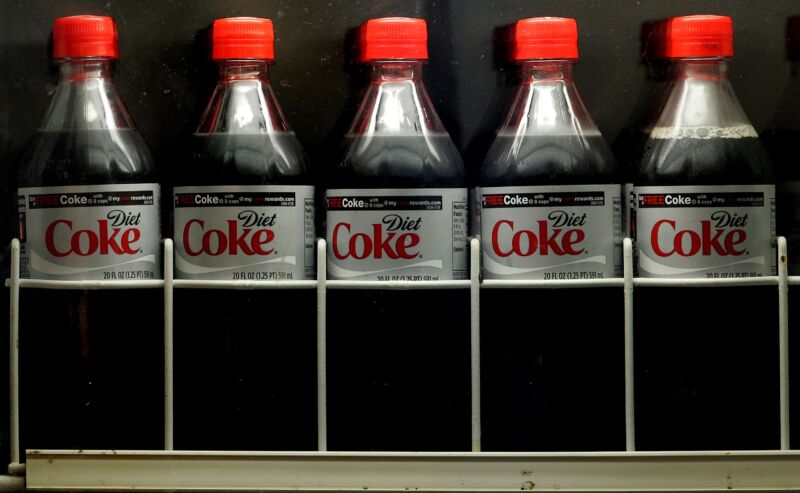Aspartame and cancer: Why you really shouldn’t worry about this

The World Health Organization’s cancer agency released an anticipated assessment late last week, finding that the common artificial sweetener aspartame “possibly” has the ability to cause cancer—specifically, a type of liver cancer called hepatocellular carcinoma.
The assessment, leaked to Reuters in June, was poised to set off alarms. But, a closer look at the designation itself, the safety evaluation of the current daily recommended limited, and the data underpinning the assessment should comfort anyone worried about their cancer risk and considering ditching their favorite diet drink or snack.
Low-confidence designation
The concern is all based on a designation from the WHO’s cancer agency—the International Agency for Research on Cancer (IARC)—labeling aspartame a Group 2B agent, which is considered “possibly carcinogenic to humans.” Group 2B is one of four possible classifications, which span “carcinogenic” (Group 1), “probably” carcinogenic (Group 2A), “possibly” carcinogenic (Group 2B), and “not classifiable” (Group 3). This is the first time the IARC has evaluated aspartame—it’s not an update to a previous assessment.
The Group 2B designation is low-confidence by definition, based on “limited evidence.” It’s intended to spur more research more than anything. The 322 other agents with a 2B designation include Ginkgo biloba extract, Aloe vera whole leaf extract, and radio-frequency electromagnetic waves. And, importantly, the IARC assessment and designation do not address the exposure level at which a 2B agent would potentially begin to pose their possible cancer risk. For food additives, there’s a separate committee for that—the Joint Expert Committee on Food Additives (JECFA) for the WHO and the Food and Agriculture Organization (FAO).
JECFA did a separate evaluation of aspartame recently, its third evaluation for the popular diet sweetener. It released its conclusion jointly with the IARC assessment last week. In contrast to the cancer agency, JECFA found no convincing link between aspartame and any type of cancer, including hepatocellular carcinoma. “[A] consistent association between aspartame consumption and a specific cancer type was not observed,” the committee concluded its assessment report.
Overall, JECFA concluded once again that it is safe to consume aspartame at the committee’s previously established daily limit, called the acceptable daily intake (ADI), set at 0–40 mg/kg body weight. And most people probably stay within this fairly easily. As an example, the committee noted that, with a can of diet soda containing between 200 and 300 mg of aspartame, an adult weighing 70 kg (about 154 pounds) would need to consume between 9–14 cans of soda per day to exceed the ADI, assuming no other intake from other aspartame-containing foods, such as sugar-free gums, Jell-O, or syrup.
Limited evidence
Though the two groups came to seemingly different conclusions, they based their assessments on the same body of data—which, again, is limited.
There are some animal studies linking aspartame to cancers, but both groups concluded that the data is questionable. Following three mouse and rat studies from one research group linking aspartame to cancer, the IARC concluded it had “concerns over the study design, interpretation and reporting of data.” JECFA looked at 12 studies, noting that the three studies the IARC mentioned were the only ones that claimed to find a cancer link. The committee was more specific in its criticism of the three studies, noting that they lacked controls, adjustments for litters effects, and background levels of cancers. Overall, JECFA concluded the studies were of “uncertain relevance” and did not establish a connection between aspartame and cancer.
JECFA also took aim at the mechanism by which aspartame might spur cancers—noting that, essentially, there isn’t one so far. The committee reviewed recent lab studies suggesting that aspartame may cause oxidative stress in cells, which can be a cancer trigger. But JECFA noted that toxicity studies of aspartame have failed to turn up hallmarks of prolonged oxidative stress, knocking back the suggestion.
The committee further noted that, when consumed, aspartame quickly breaks down in the gastrointestinal tract into three common metabolites: phenylalanine, aspartic acid, and methanol. These metabolites are not specific to aspartame and are released from commonly consumed foods. Moreover, oral aspartame studies have found that plasma concentrations of those common metabolites do not increase above normal levels after aspartame consumption.
But, the crux of the discrepancy between JECFA’s and IARC’s take on aspartame come down to just three large cancer studies in humans. The IARC summarized them as showing a “positive association” between aspartame and risk of liver cancer. JECFA summarized them as being “not convincing.”
https://arstechnica.com/?p=1954575